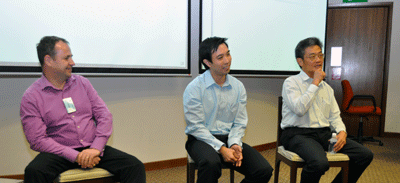In a fascinating four-hour seminar on Asian innovation titled Asian Innovators: Developing The Next Generation, several myths about innovation were debunked by the four speakers.
Take the notion that the Japanese are leaders of innovation. Not so, said innovation management trainer Lawrence Chan. He has coached executives from six Asian countries and in the classes he taught, the Chinese had proven to be the most innovative in Asia while the Japanese and Singaporeans trailed behind.
Or the view that experience makes one better at innovating.
“From my experience in training executives, the more experience an individual has, the more he is hindered in creativity and innovation,” declared Lawrence. “In fact, the most ideas an employee has is when he first joins an organisation. After two weeks, he no longer has any ideas.”
Speaker Hugh Mason had an interesting definition of innovation: “Creativity sparks when worlds collide in your head. When two ideas collide, for a moment you will feel uncomfortable because you don’t know how they fit together. And innovation is what happens when you realise that they do fit together, when the worlds meld together in your head.”
Hugh is the CEO of The Joyful Frog Digital Incubator which operates the longest-running, most successful seed accelerator programme in South East Asia; it takes teams of entrepreneurs from idea to investment in 100 days. Hugh was formerly a physicist and producer of the long-running BBC television programme Tomorrow’s World.
Another speaker, Stuart Smith spoke on whether innovativeness was nurture or nature. The Deputy Chief of Service Innovation at ISS has spent almost his entire career driving innovation and in his opinion, innovation was more critical for businesses at this time than any other age before.
Said Stuart, “We are all equal now in terms of the ability to acquire knowledge. In an age when all you need to become knowledgeable is to Google, having knowledge is not enough to get ahead. Innovation is important because we are in an epoch of hyper, rapid change.”
The final speaker, Lee How Sheng, Head of Corporate Planning at Singapore Pools, spoke about his organisation’s in-house innovation programme called I³ (Ideas, Innovations, Improvements). In 2010, Singapore Pools rolled out I³ with ISS as its consultant because it had wanted to foster a culture of questioning within the organisation.
“In a world where strategic life cycles are shrinking, we recognise that innovation is the only way to renew an organisation’s lease on life,” explained How Sheng.
The programme led to the generation of 59 ideas in the first year, with 13 shortlisted for further consideration and seven that were eventually pilot tested. More importantly, the programme created an innovative and experimental culture within Singapore Pools, said How Sheng.

Panel Discussion: Challenges, barriers and how to overcome them
The Inside Track on Innovation
- “To be an innovator, you have to be lazy and intelligent because only lazy people will look to innovation to find shortcuts. The role of an innovation coach is to inculcate laziness in the people you coach.”
- “For innovation, develop a cornerstone habit: Have fun at it!”
Lawrence Chan, corporate trainer specialising in innovation management
- “For innovation, don’t think. Do lah.”
- “Entrepreneurs are explorers sailing on a sea of possibilities, trying to discover treasure islands.”
Hugh Mason, CEO, The Joyful Frog Digital Incubator
- “Experiential learning is good for skill acquisition and for pattern recognition to develop. Pattern recognition is particularly important for innovators because the more patterns one sees, the more ideas one would come up with. Because of this, innovators learn by doing.”
- “Innovation is important in Singapore because all the low-hanging fruits are gone.”
Stuart Smith, Deputy Chief, Service Innovation, Institute of Systems Science
Click here to subscribe to ISS mailing list.